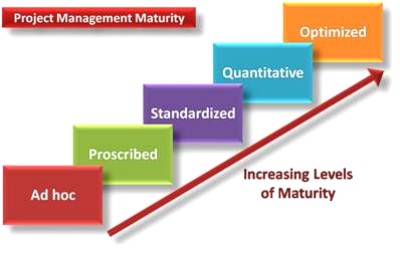|
Project Management Maturity ModelNavigating Through The Issues
The origin of the concept of a project management maturity model, is lost in the mists of time. With evidence of project management skills as far back as the time of the building of the Pyramids and the Great Wall of China and other great wonders of the world - it is quite logical to assume that there could have been an early project management maturity model to map the progress of developing project management skills. After all, for an ancient project manager the price of failure came high! In more recent times the concept of a project management maturity model has evolved considerably from the software industry with the need to understand and measure many variables, manage great complexity, obtain consistent results and achieve stringent delivery targets within budget. With regard to which project management maturity model is the "best" or most appropriate for any specific situation [I fully appreciate that project management professionals reading this may disagree with what I am about to say, but] I feel the far bigger challenge is actually in getting ANY project management maturity model applied. From that point on, and with director level sponsorship and support - all things are possible. There are many types of project management maturity model [I am aware of over 35] and the dominant project management maturity model is the P3M3 Model created and sponsored by the OGC [UK Office of Government and Commerce] in association the APMG [UK Association of Project Management Group]. This is a composite and enhanced project management maturity model that addresses the 3 related aspects of large-scale project management and that glories in the full title of “Portfolio, Programme and Project Management Maturity Model”. Details below.
Why bother?
"Organisational Project Management Maturity describes an organisation’s overall ability to select and manage projects in a way that supports its strategic goals”. Well that all sounds very noble - but the simple rationale for having and using a project management maturity model is quite simply that projects fail! [And the same is true for programme and change management.] A survey conducted in 2003 by the Standish Group (US) showed that 66% of IT projects are either totally abandoned or fail against a measure of budget, scope, time or quality (i.e. ‘challenged’). A similar study in the UK by Computer Weekly showed that 84% of projects either failed or were challenged. It has been estimated that the cost to US business of failing or abandoned IT projects runs into hundreds of billions of dollars. Closer to home, the UK government have wasted countless billions of pounds on failed projects.
For a programme to succeed, the intended organisational benefits have to be achieved. At the programme level the failure rate remains high.
Progress driven by pain
Given that companies [or more accurately directors] don’t know what they don't know – the level of maturity of the company - as measured on any project management maturity model - remains invisible. In fact the very concept of a project management maturity model remains invisible. This is the point at which progress becomes possible as progress needs sponsorship. And as the focus shifts to improving performance, there are two principal targets. (1) To improve how any specific project, programme and change is managed. (2) To improve performance in overall organisational capability in project, programme and change management. The purpose of this assessment is to show the extent to which the infrastructure within the organisation supports the project, programme and change management efforts.
Benefits of a structured assessmentThe main benefits of the subsequent structured assessment of maturity within the organisation isn’t in understanding the current level at which the company is performing, but rather in setting direction, prioritising actions and beginning cultural change.
So, taking project management as an example: an organisational project management maturity model provides guidance to an organisation regarding how to: -
It is becoming more important for organisations to translate organisational strategy repeatedly and reliably into successful project, programme and change outcomes. In 2003 The Centre for Business Practices produced its ‘Project Management - the State of the Industry’ survey. This survey measured organisational improvement over time, as a result of project management improvement programmes. The highlights of which show significant improvements in terms of financial performance, customer retention and satisfaction, project and process improvement, employees satisfaction and productivity, and a dramatic 70% increase in project alignment with strategic objectives. Here is a summary of the results:
Additional Resources
Prosci’s Change Management Maturity Model is based on benchmarking research and interactions with companies going through change. The model sets out the varying levels of change management capability across organisations. In common with most models of this nature, this model has five levels of competence - from no change management to organisationalwide competency. Each level maps the increased focus on the people aspects of change. Change Management Maturity Model- The Prosci Model
Business Process Maturity Model was created by Bill Curtiss, Chief Process Officer, McAfee; and John Alden, Managing Partner, Capability Measurement. This model provides an open-standard roadmap for assessing process maturity and guiding business process improvement and is currently being promoted as an OMG standard by the Business Process Management Steering Committee within the ObjectManagement Group (OMG). Business Process Maturity Model - A roadmap for continuous process improvement
Programme Management (1) Managing complexity across multiple projects Programme management as discipline has evolved from project management in response to the requirements of managing the complexity of mulitple projects simultaneously. (2) Realising the organisational benefits - from the delivery of the new capability A holistic approach that links vision to strategy and all the way through to implementation and successful benefit realisation. Programme Management- and Programme Management Maturity Models
Project Management
Project management is about the focused execution of a series of tasks to make a deliverable, on time, in scope and in budget. What is project management? - What value does it add to change management?
Project management principles - 10 ways to make a project fail Project management methodologies - 8 ways to succeed Project management skills - 8 key factors Project Smart - Project management steps and resouces
|



 Project Management Maturity Model - An Overview
Project Management Maturity Model - An Overview

